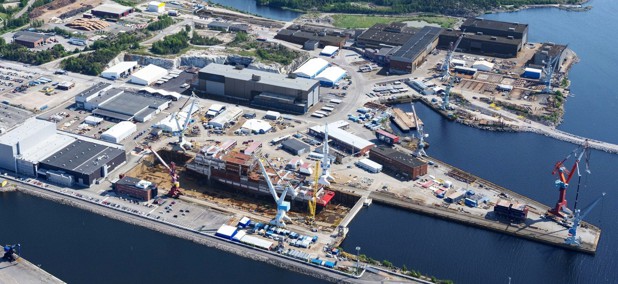World
Trump’s Icebreaker Deal Raises Concerns for U.S. Shipbuilding

The recent memorandum signed by former President Donald Trump with Finland on October 9, 2023, has put the future of American shipbuilding in a precarious position. The agreement involves a “block buy” of U.S. Coast Guard icebreakers, with the initial four vessels to be constructed in Finnish shipyards, followed by seven planned for American facilities. This arrangement raises significant concerns among industry experts about the long-term implications for U.S. naval capacity and domestic shipbuilding capabilities.
Many view the deal as a potential step backward for American maritime interests. Jerry Hendrix, who currently leads the White House Shipbuilding Office, celebrated the agreement on social media, suggesting it showcased Trump’s negotiation skills. However, critics argue that outsourcing the production of naval vessels could undermine ongoing efforts to revitalize American shipbuilding and jeopardize national security.
Concerns Over Outsourcing Naval Production
The decision to allow foreign construction of icebreakers contradicts the bipartisan vision of an American maritime renaissance. Experts emphasize that the ability to build a capable fleet within the U.S. is vital for national defense. History illustrates this point; during World War II, the U.S. Navy’s success at the Battle of Midway was possible due to a robust shipbuilding capacity that allowed for rapid replacement of losses. The current state of American shipbuilding, however, has diminished significantly since those days.
The decline can be traced back to policy decisions made in the 1980s and 1990s, which curtailed government support for the commercial shipping and shipbuilding sectors. This led to a consolidation of the remaining naval shipbuilding base into a few uncompetitive entities. As a result, the prospect of outsourcing warship production is seen as detrimental to the nation’s strategic interests.
While President Trump has previously championed investment in U.S. shipyards by allied nations, this latest move could undermine those achievements. The Maritime Statecraft strategy, which emphasizes market competition through foreign investment in U.S. shipbuilding, has already shown promise. For instance, Hanwha, a prominent South Korean shipbuilder, acquired the Philly Shipyard in 2022, committing to a $5 billion investment aimed at modernizing its facilities and increasing production.
Implications for Future Maritime Strategy
The deal with Finland poses risks not only to the shipbuilding industry but also to U.S. national security. The agreement’s reliance on foreign shipyards raises questions about safeguarding U.S. naval design and technology. Additionally, many of the allied shipyards are located within reach of hostile forces, such as China and Russia, which could pose strategic vulnerabilities.
Furthermore, the outsourcing model could diminish America’s leverage in negotiations with world-class shipbuilders. The lucrative nature of U.S. naval contracts has been a major incentive for foreign firms to invest domestically. However, by outsourcing ship construction, the U.S. government risks eroding this competitive edge, making it less appealing for foreign companies to invest in American shipyards.
The upcoming Asia Pacific Economic Community summit in South Korea could serve as a pivotal moment for U.S. maritime strategy. This summit presents an opportunity to solidify trade relations and foster greater investment in U.S. shipbuilding. The South Korean government has already proposed a “Make American Shipbuilding Great Again” initiative, which includes $150 billion in loans to stimulate investment in U.S. shipbuilding without requiring outsourcing.
Trump’s agreement with Finland threatens to overshadow these potential advancements. If the administration pursues outsourcing further, it risks undermining the progress made towards enhanced foreign investment in American shipyards.
The ramifications of this deal extend beyond immediate benefits. Critics argue that it jeopardizes the long-term health of the U.S. maritime industry and the essential jobs associated with it. As the nation navigates complex international relations and military commitments, maintaining a strong domestic shipbuilding capacity is critical.
In conclusion, President Trump’s icebreaker deal could have far-reaching consequences for American shipbuilding and national security. The focus should remain on strengthening domestic capabilities and ensuring that the U.S. continues to lead in naval power. A commitment to building warships on American soil is paramount to securing a robust maritime future. Only through sustained investment and adherence to established laws can the U.S. restore its maritime strength.
-

 Science4 weeks ago
Science4 weeks agoALMA Discovers Companion Orbiting Giant Red Star π 1 Gruis
-

 Politics2 months ago
Politics2 months agoSEVENTEEN’s Mingyu Faces Backlash Over Alcohol Incident at Concert
-

 Top Stories2 months ago
Top Stories2 months agoNew ‘Star Trek: Voyager’ Game Demo Released, Players Test Limits
-

 World2 months ago
World2 months agoGlobal Air Forces Ranked by Annual Defense Budgets in 2025
-

 World2 months ago
World2 months agoMass Production of F-35 Fighter Jet Drives Down Costs
-

 World2 months ago
World2 months agoElectrification Challenges Demand Advanced Multiphysics Modeling
-

 Business2 months ago
Business2 months agoGold Investment Surge: Top Mutual Funds and ETF Alternatives
-

 Science2 months ago
Science2 months agoTime Crystals Revolutionize Quantum Computing Potential
-

 Top Stories2 months ago
Top Stories2 months agoDirecTV to Launch AI-Driven Ads with User Likenesses in 2026
-

 Entertainment2 months ago
Entertainment2 months agoFreeport Art Gallery Transforms Waste into Creative Masterpieces
-

 Business2 months ago
Business2 months agoUS Government Denies Coal Lease Bid, Impacting Industry Revival Efforts
-

 Lifestyle2 months ago
Lifestyle2 months agoDiscover Reese Witherspoon’s Chic Dining Room Style for Under $25









